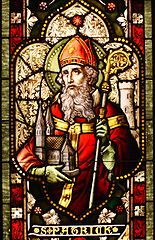
The Life And Writings Of Saint Patrick -Saint Patrick
I.—HIS DAILY LABOURS
PATRICK’S life during his residence in Armagh during this last period of his career was in many respects quite different from the more active years of his earlier missionary life in Ireland. From his arrival in Ireland in 432, to his foundation of Armagh in 457, his life was that of an active missionary prelate, as the whole course of this narrative hitherto has amply shown. He shrank from no labour, he was deterred by no obstacles, he feared no dangers. In this, as in many other respects, his life and labours bear a striking resemblance to the life and labours of St. Paul during his missionary journeys.
But when he had settled down in Armagh, his course of life was of necessity greatly changed. Thenceforward the routine of his life did not in any essential points differ from that of other great prelates with an enormous diocese to govern. We may be sure he never neglected the daily celebration of the Divine Office and of the Sacred Mysteries. To the former he was bound as a priest; as a man of prayer, living in constant communion with God, we may be sure he would not neglect the latter.
Then, it is a primary obligation on all prelates to visit from time to time personally, or by deputy, the churches within their jurisdiction. As it is said in the Book of Armagh, all Ireland was Patrick’s parochia, or diocese, as it was called later on. If any grave matter occurred in any of the churches of the Irish Tribes, especially in those founded by himself, Patrick would not neglect either to visit the place in person, or send his Coadjutor to investigate the case and apply a suitable remedy. In fact we find, as in the case of Ardagh, that if any rumours of a grave scandal occurring in any of his churches reached his years, Patrick, in spite of his years, made an effort to visit the place himself, and apply a suitable remedy. In this matter his life affords a noble lesson of unwearied zeal to all Irish bishops for all time.
Then, again, when Patrick founded his Primatial See of Armagh that city became a place of pilgrimage for fervent Christians, not only from all parts of Ireland but also from Britain and Gaul. References are made in the Book of Armagh to these pilgrimages, and, as it was customary to see the Irish Saint and get his blessing, just as people now go to Rome to see the Pope and get his blessing, the Saint must have spent many an hour in receiving, and blessing, and giving counsel to priests and prelates from all parts of Ireland, and sometimes from Gaul and Britain.
Then Patrick had, moreover, the ordinary work of a prelate in the diocese under his immediate jurisdiction in relation to his clergy, his monks, his nuns, his students, his flock generally; and although we know he had the assistance of a Coadjutor in his declining years to aid him in the performance of his manifold duties, still to the last his must have been an anxious and laborious life, burdened with many cares and crowded with many toils.
We must bear in mind, too, that at this time Patrick was very old, though, doubtless, very hale, in consequence of his temperate life, spent for the most part in the open air. But in the midst of all his toils he was, as he tells us himself, sustained by God, to whom he justly attributes all the success of his manifold labours. This was in truth the whole secret of his marvellous work in Ireland. He was a man of prayer, who always lived in the presence of God, and, conscious of the Divine Commission and the Divine help, he faced every danger and overcame every obstacle. Such is in fact the whole tenor of his Confession; and, as we have said more than once, Patrick’s conversion of Ireland in face of the difficulties he had to encounter cannot be rationally explained on any other hypothesis. It was the work of God through the agency of a devoted man, ‘for whom the love and service of Christ my Lord,’ as he said, was the one all-absorbing purpose of his life.
He had, however, to deal with some things that caused him great trouble, even in the midst of his own religious family, if we can credit the story told in the Tripartite regarding Lupita when she dwelt at Armagh, which it is our duty, as faithful historians, to reproduce here.

 Keep Site Running
Keep Site Running